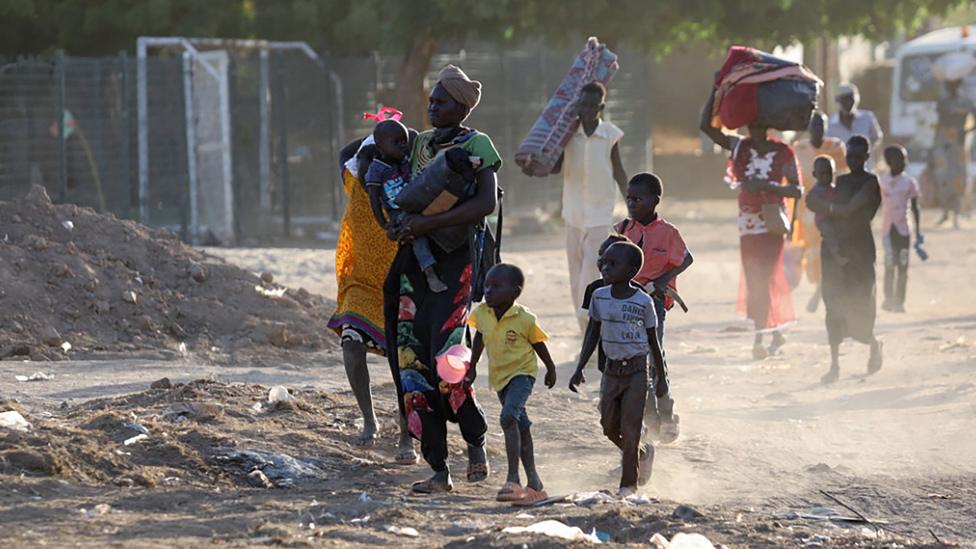Sudan: Why has fighting broken out there?
- Published
Watch: Sheltering from fighter jets and gunfire around Khartoum airport
The fighting that has erupted in the Sudanese capital, Khartoum, and elsewhere in the country is a direct result of a vicious power struggle within the country's military leadership.
The clashes are between the regular army and a paramilitary force called the Rapid Support Forces (RSF).
Where is Sudan?
Sudan is in north-east Africa and is one of the largest countries on the continent, covering 1.9 million square kilometres.
It is also one the poorest countries in the world, with its 46 million people living on an average annual income of $750 (£606) a head, external.
The population of Sudan is predominantly Muslim and the country's official languages are Arabic and English.

Who is fighting who in Sudan?
Since the 2021 coup, Sudan has been run by a council of generals, led by the two military men at the centre of this dispute:
Gen Abdel Fattah al-Burhan, the head of the armed forces and in effect the country's president
And his deputy and leader of the RSF, Gen Mohamed Hamdan Dagalo, better known as Hemedti.
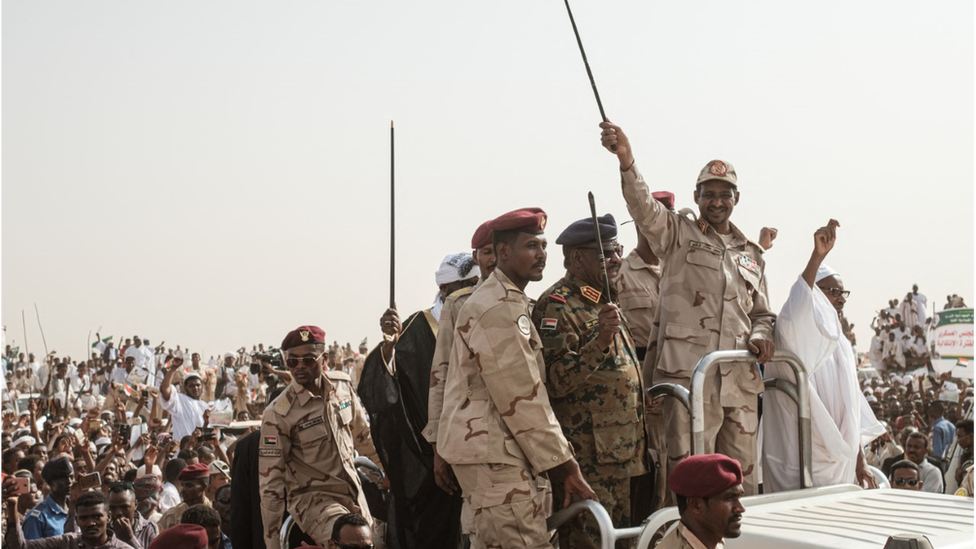
Gen Dagalo, head of the RSF, among supporters
They have disagreed on the direction the country is going in and the proposed move towards civilian rule.
The main sticking points are plans to include the 100,000-strong RSF into the army, and who would then lead the new force.
Why did the fighting in Sudan start?
The shooting began on 15 April following days of tension as members of the RSF were redeployed around the country in a move that the army saw as a threat.
There had been some hope that talks could resolve the situation but these never happened.
It is disputed who fired the first shot but the fighting swiftly escalated in different parts of the country with more than 400 civilians dying, according to the World Health Organization.
Why have civilians got caught up?
Even though the conflict appears to be around the control of key installations, much of it is happening in urban areas and civilians have become the unwitting victims.
It is not exactly clear where the RSF bases are, but it seems that their fighters moved into densely populated areas.
The Sudanese air force has mounted air strikes in the capital, a city of more than six million people, which is likely to have led to civilian casualties.
Several ceasefires have been announced to allow people to escape the fighting but these have not been observed.
What are the Rapid Support Forces?
The RSF was formed in 2013 and has its origins in the notorious Janjaweed militia that brutally fought rebels in Darfur, where they were accused of ethnic cleansing.
Since then, Gen Dagalo has built a powerful force that has intervened in conflicts in Yemen and Libya. He has also developed economic interests including controlling some of Sudan's gold mines.
The RSF has been accused of human rights abuses, including the massacre of more than 120 protesters in June 2019.
Such a strong force outside the army has been seen as a source of instability in the country.
Why is the military in charge of Sudan?
This fighting is the latest episode in bouts of tension that followed the 2019 ousting of long-serving President Omar al-Bashir, who came to power in a coup in 1989.
There were huge street protests calling for an end to his near-three decade rule and the army mounted a coup to get rid of him.
But civilians continued to campaign for the introduction of democracy.
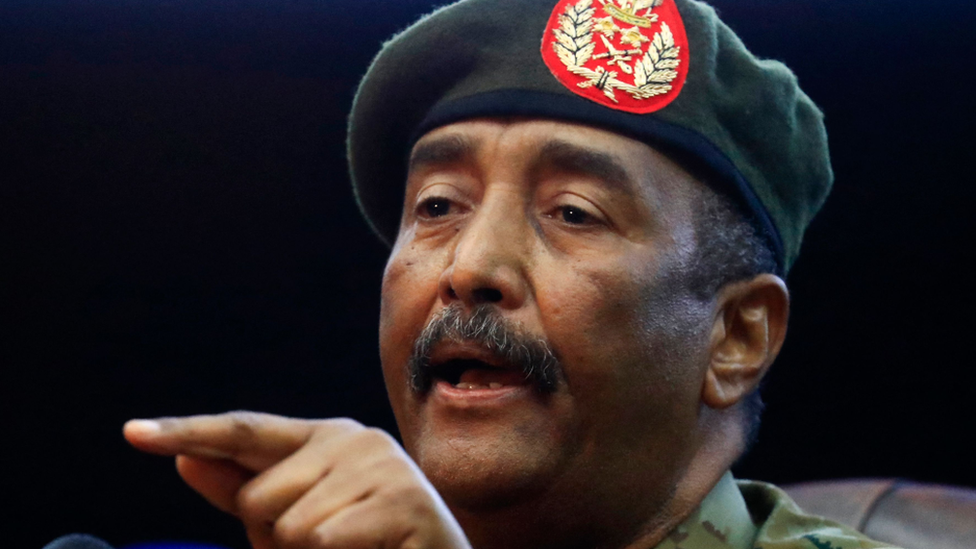
Sudan's military leader, Gen Abdel Fattah al-Burhan
A joint military-civilian government was then established but that was overthrown in another coup in October 2021, when Gen Burhan took over.
And since then the rivalry between Gen Burhan and Gen Dagalo has intensified.
A framework deal to put power back in the hands of civilians was agreed last December but talks to finalise the details have failed.
What do the two sides want?
Gen Dagalo has said, in a series of tweets, that Gen Burhan's government were "radical Islamists" and that he and the RSF were "fighting for the people of Sudan to ensure the democratic progress for which they have so long yearned".
Many find this message hard to believe, given the brutal track record of the RSF.
Gen Burhan has said he supports the idea of returning to civilian rule, but that he will only hand over power to an elected government. Some suspect him of having links to ex-President Bashir and his allies, which the army has denied.
There are suspicions that both generals want to hang on to their positions of power, unwilling to losing the wealth and influence that go with them.
What are other countries doing?
There are fears that the fighting could further fragment the country, worsen political turbulence and draw in neighbouring states.
Diplomats, who have played a crucial role in trying to urge a return to civilian rule, have been trying to find a way to get the two generals to talk.
Soon after the fighting began a regional bloc agreed to send three presidents - from Kenya, South Sudan and Djibouti - to Khartoum, but the mission never happened.
The UK, US and EU have all called for a ceasefire and talks to resolve the crisis and many countries are now focused on trying to get their citizens out.
Related topics
- Published15 April 2023
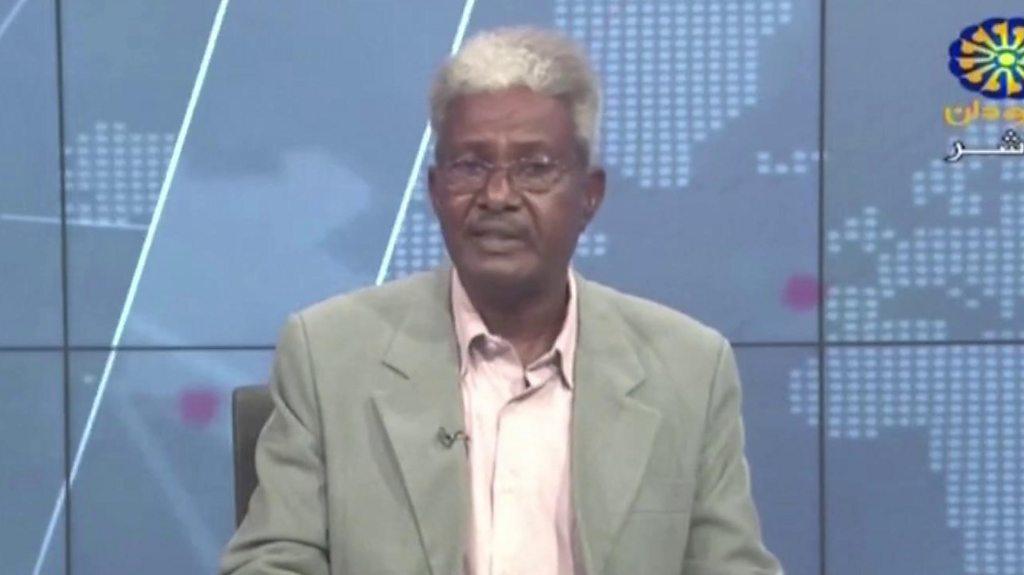
- Published17 April 2023
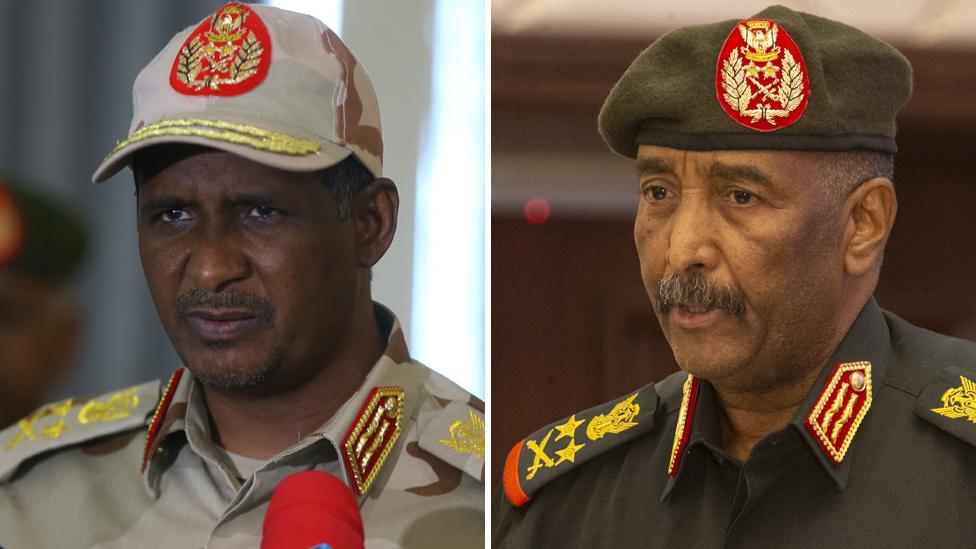
- Published22 April 2023
